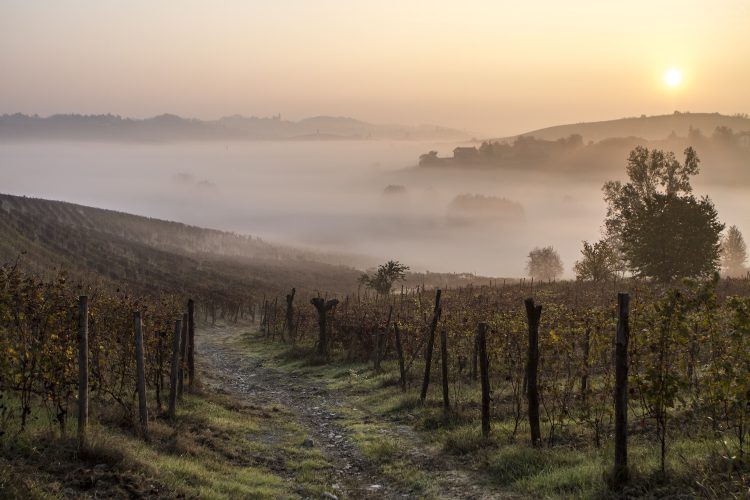TriplePundit • How a 133-Year-Old Italian Winery Protects Its Vines and the Nature Around Them

Welcome to 3p Happy Hour! As we all eye the exit door on Friday afternoons, we’re raising our glasses to the sustainable wine, beer and spirits brands serving up stiff sips with less environmental impact while benefiting communities.
The Piedmont Region in Northwest Italy is steeped in history. Some of the earliest mentions of winemaking in the region come from the Middle Ages, already prized its well-known Nebbiolo grapes. At the time, serious punishments were imposed for even cutting the vines. Despite centuries of tradition, the area is adapting to modern times by prioritizing the environment.
One operation embracing that trend is Coppo Winery. One of the oldest wineries in Italy, the company produces Barbera, Chardonnay, Moscato, sparkling wine and other offerings. And it’s part of a UNESCO World Heritage site for its underground cathedrals, or labyrinth of wine cellars and tunnels dug into the surrounding hillsides.
It has another treasure up its sleeve, too: sustainable vineyards. The Piedmont winery minimizes synthetic pesticide and fertilizer use through natural pest control, compost and cover crops. This mitigates pesticides’ damage on the environment and human health, and keeps pesticide residues from impacting the quality and flavor of the wine. Similarly, excessive fertilizer use can pollute the air and water. With an openness to new techniques and experimentation, Coppo is leading the way to crafting a cleaner wine for the environment. From breadcrust-flavored Spumante to jasmine-kissed Chardonnay, it’s a tradition you can feel good uncorking.
Founded in 1892, Coppo has long strived to minimize its environmental footprint. “Since 2001, we have followed an integrated agriculture approach that prioritizes farming methods with minimal environmental impact,” Giuditta Soldadino, owner of Coppo Winery, said in an email to TriplePundit.
The winery is certified under a voluntary national program, the SQNPI certification (or National Quality System for Integrated Production), aimed at minimizing pesticide, fertilizer and water use. So it uses more natural methods to manage pests.
“To keep pests under control and cut down on synthetic pesticides, we use pheromones — natural substances that confuse insects and prevent them from reproducing,” Soldadino said.
Flooding vineyards with female pest pheromones, a chemical they would already naturally produce and release, attracts males. But with more pheromones floating throughout the area, the probability of a male finding a female is lowered.
“The result is what’s known as sexual confusion, significantly reducing the pest population without impacting beneficial insect species,” Soldadino said. “By interfering with mating rather than applying broad-spectrum insecticides, this method protects ripening grapes from damage while helping us maintain biodiversity and support a balanced, sustainable vineyard ecosystem.”
Coppo uses this technique to target two major pests: European grapevine and European grape berry moths. Research has also found it to be effective, significantly reducing populations of both pests in vineyards.
At times, Coppo does have to resort to synthetic pesticides, but only when absolutely necessary and following the SQNPI guidelines, Soldadino said.
The winery safeguards its vines the world around them with a few other techniques, too, including avoiding synthetic fertilizers. “We fertilize exclusively with organic compounds such as humus, compost, organo-mineral fertilizers and manure,” Soldadino said. “This helps us maintain healthy, balanced soils without relying on synthetic inputs.”
Coppo further reduces its need for fertilizer through a practice known as green manure. This involves growing cover crops in their vineyards — like grass, clover, field bean and barley — and incorporating them into the soil. The technique promotes soil fertility, while boosting biodiversity, preventing erosion and weed growth and increasing the soil’s ability to retain water.
As a result of its sustainable practices, Coppo has noticed a few changes. Biodiversity increased in their vineyard and the surrounding area, and its product has improved.
“We have noticed greater consistency in grape quality, even across vintages marked by varying climatic conditions,” Soldadino said. “This consistency is essential in order to preserve the identity of our wines, ensuring reliability over time and distinctiveness of flavors.”
Despite going green, the winery faces some changes on the path ahead. “Climate change is an undeniable reality that we’re seeing firsthand in Piedmont through rising temperatures, earlier harvests and increasingly frequent periods of drought,” Soldadino said. “Water stress has become a growing concern, especially in a region like ours where irrigation is limited and rainfall patterns have become less predictable.
Its environment-conscious approach is also a part of its solution to climate-related struggles, alongside practices like planting vineyard at higher altitudes where temperatures are cooler and finding ways to protect grapes from excessive heat. “At Coppo, we’ve responded by focusing on long-term sustainability and resilience in the vineyard,” Soldadin said. “Our viticultural approach … also helps foster biodiversity and soil health, which are key to withstanding climate variability.”
With a 130-year history and decades of work in minimizing environmental impact to build from, Coppo is set to meet the growing demand for sustainable wine without sacrificing its origins. “Ultimately, our goal is to adapt thoughtfully and protect not only the identity of our wines, but also the land that defines them,” Soldadino said.
Editor’s note: The author received wine samples from Coppo Winery. Neither the author nor TriplePundit were required to write about the brand.



Post Comment